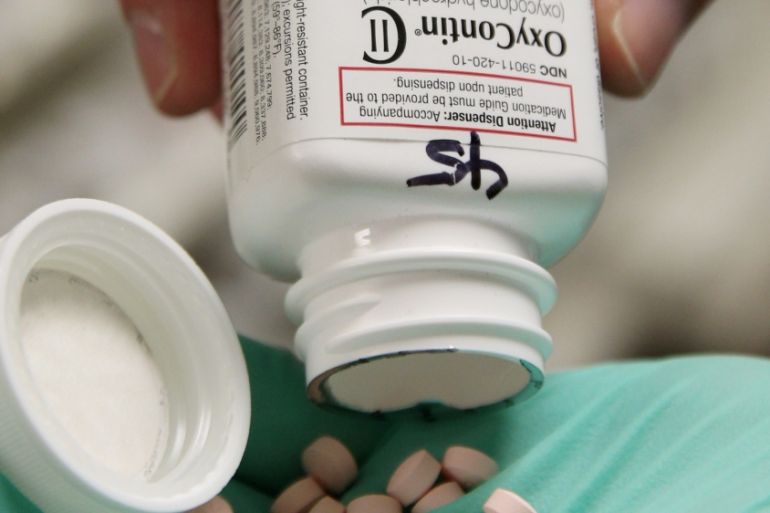Purdue Pharma nears partial opioid settlement, bankruptcy filing
Reuters reports that OxyContin maker is on the cusp of a deal with attorneys representing more than 2,000 plaintiffs.

OxyContin maker Purdue Pharma LP is close to a partial agreement to resolve widespread litigation over its alleged role in fueling the United States opioid crisis.
The company also has plans to tussle with states opposing its settlement offer in bankruptcy proceedings starting as soon as next week, people familiar with the matter told the Reuters news agency.
Keep reading
list of 4 itemsWhy are some countries decriminalising drugs?
Tonnes of cocaine seized after high-speed boat chase in Colombia
Germany legalises cannabis possession for personal use from April
Lead lawyers representing more than 2,000 cities, counties and other plaintiffs suing Purdue, along with around two dozen states and US territories, have all but agreed on an offer from the company and its controlling Sackler family to settle lawsuits in a deal valued at up to $12bn.
Attorney Paul Farrell told the Associated Press on Wednesday that lawyers have agreed to the deal that has been on the table for several weeks now.
But more than a dozen other states remain opposed or uncommitted to the deal, setting the stage for a legal battle over Purdue’s efforts to contain the litigation in bankruptcy court. States were expected on Wednesday to update a federal judge on the settlement offer’s support, which remained in flux.
Purdue’s board is scheduled to be briefed on settlement progress on Thursday. There remained a chance that negotiations could fall apart and the company’s plans – including the timing of a bankruptcy filing – could change.
The Sacklers, well-known wealthy philanthropists, have declined to revise their proposed settlement contribution of $3bn over seven years and another $1.5bn or more through the eventual sale of another business they own, called Mundipharma.
New York, Massachusetts and Connecticut, where privately-held Purdue is based, are among the states opposed to the current offer and have reportedly pushed the family to guarantee $4.5bn.
‘Toward a global resolution’
Last weekend, the Sacklers “refused to budge” after attorneys general in North Carolina and Tennessee presented the family with counterproposals they said had widespread support from other states.
The lawsuits, which have in some cases targeted the Sacklers as well as Purdue, claim the family and company contributed to a public health crisis that claimed the lives of nearly 400,000 people between 1999 and 2017, according to the latest data from the US Centers for Disease Control and Prevention.
The suits allege Purdue aggressively marketed prescription painkillers while misleading doctors and patients about their addiction and overdose risks. Purdue and the Sacklers have denied the allegations.
With negotiations over the family’s contribution to a settlement at loggerheads, Purdue is preparing to file for bankruptcy protection as soon as this weekend or next with the outlines of a settlement in hand, albeit one lacking support from many states.
“The family supports working toward a global resolution that directs resources to the patients, families and communities across the country who are suffering and need assistance,” members of the Sackler family, including some who previously served on Purdue’s board, said in a statement.
“This is the most effective way to address the urgency of the current public health crisis, and to fund real solutions, not endless litigation,” the statement added.
Company representatives had no immediate comment.
‘Give back the money’
With Purdue facing more than 2,000 opioid-related lawsuits, the Sacklers began exploring bankruptcy options many months ago to halt litigation and attempt to reach a far-reaching settlement rather than fight every case individually.
One reason Purdue is eyeing a bankruptcy filing soon may be to avoid an October 21 trial stemming from widespread lawsuits largely brought by local governments that have been consolidated in an Ohio federal court. The case risks a verdict with outsized damages Purdue likely could not withstand.
Purdue’s current proposal envisions it using bankruptcy proceedings to transform into a public trust with a board selected by court-appointed trustees. The trust would donate to US communities the drugs that the company developed to combat overdoses and addiction, which Purdue values at $4.45bn over 10 years.
The Sacklers, who amassed a multibillion-dollar fortune from OxyContin sales, would cede control of Purdue.
A Chapter 11 bankruptcy filing – with a deal many states oppose – risks triggering even more litigation and longer, more expensive bankruptcy proceedings that could reduce payouts to plaintiffs unless a broader deal is reached.
“I remain steadfast in my view that the Sacklers have to give back the money they took from selling opioids so that we can put it toward solving the problem they created,” said Connecticut Attorney General William Tong in a statement provided to Reuters.
“The current proposal does not do that. This is not the end. There is a long road to go and we are ready for this fight and ready go to the distance.”
The Sacklers have reportedly rebuffed requests from some plaintiffs for more details about the family’s finances to address concerns that more settlement money could be available.